Putin Declares Unilateral Easter Ceasefire
With a Kremlin-Friendly White House, Kyiv Finds Itself in a Tight Spot
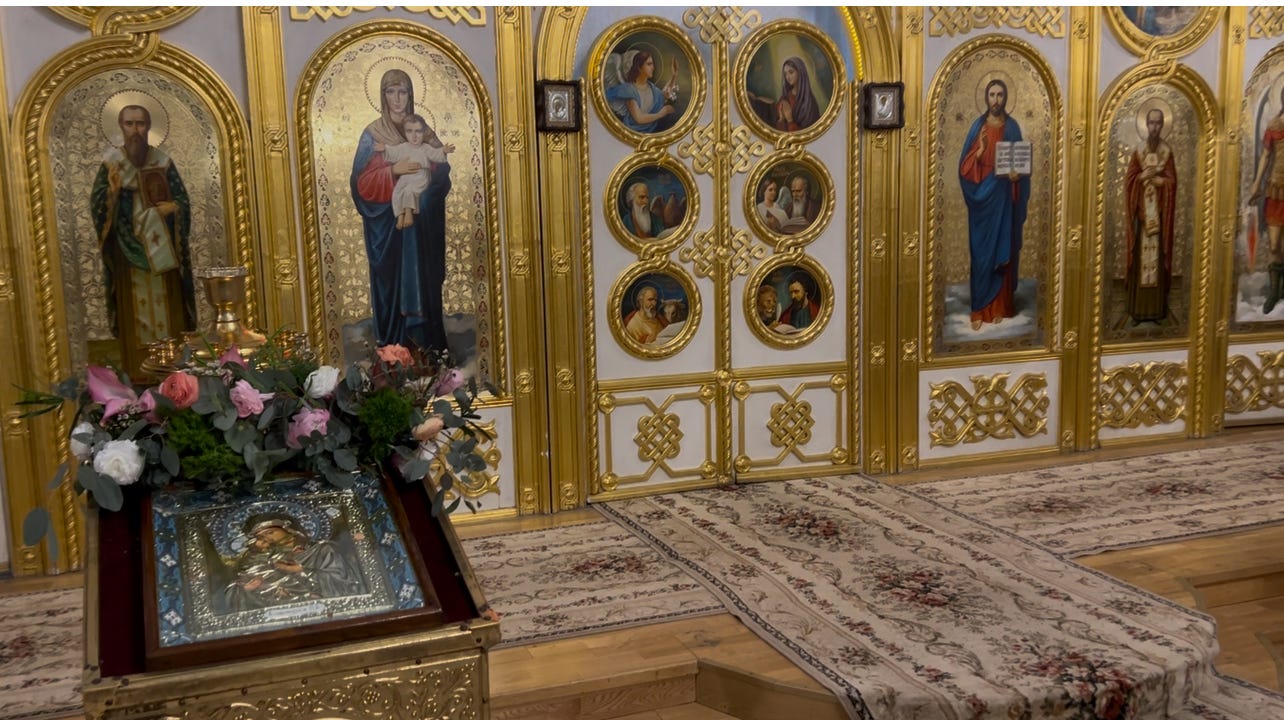
Russian President Vladimir Putin called for an Easter truce to pause fighting in the Ukraine war, but the proposal was quickly dismissed by his Ukrainian counterpart who said Russian attack drones were in the air even as Putin spoke. Kyiv and Moscow, meanwhile, announced a major swap of prisoners-of-war on April 19, with more than 200 men being exchanged. With Orthodox and Western Easter falling on the same day -- April 20 -- this year, Putin used a televised meeting with his top military commander to announce he was calling a two-day truce. The cease-fire, Putin said, would begin at 5 p.m. Prague time (6 p.m. Kyiv time). “We assume that the Ukrainian side will follow our example," he said while meeting General Valery Gerasimov. "At the same time, our troops must be ready to repel any possible violations of the truce or provocations from the enemy, any of its aggressive actions." Ukrainian President Volodymyr Zelenskyy quickly dismissed the call, calling it "yet another attempt by Putin to play with human lives." Attack "drones in our skies reveal Putin’s true attitude toward Easter and toward human life," Zelenskyy said in a post to X.
Despite Ceasefire, Attacks Continue
At around 20:00 Kyiv time, hours after Russia’s unilateral ceasefire announcement, a 42-year-old man was injured in a Russian drone strike on Primorske, Zaporizhzhia, according to the regional military administration via Suspilne News. An explosion was also reported in Kharkiv this evening.Major Prisoner Exchange Brokered by UAE
Earlier today, Russia and Ukraine carried out the largest prisoner swap in three years, with 277 Ukrainian servicemen returning home. The exchange, mediated by the UAE, saw the release of mostly young soldiers—many born after 2000.
Comment: As I told France 24 shortly after news broke of Russia’s unilateral ceasefire, it’s hard not to be cynical about Mr. Putin’s motives. The Kremlin has violated countless truces since 2014, including OSCE-brokered ones. I suspect the Trump administration pushed for this short pause—if it holds, Trump can take credit and use it to energize his Christian right base. There’s also a real chance Russia will stage an incident - or fabricate one - to make it look like Kyiv broke the ceasefire, putting President Zelensky in a difficult position (already the Russian-installed regional leader in occupied Kherson accused the Ukrainian side of “continuing to strike peaceful cities” this evening). Trump has again voiced disdain for Zelensky, leaving Kyiv increasingly isolated. In Ukraine, daily life continued. In Odesa, just an hour after the announcement, families were strolling in parks, shopping, and preparing for Easter. But ceasefire or not, the scars of war remain—felt even in the churches. At the Orthodox church around the corner from me, the parish priest paused amid Easter preparations to talk. He told me that an astonishing 70% of his parishioners have fled overseas. “It makes it very difficult on us—church collections are down and we had a fire a few months ago. We could hardly afford the flowers for the altar.”
My on-the-ground video report on Good Friday from the doorsteps of the largest Orthodox cathedral in Odesa
The Trump administration is ready to recognize Russian control of Crimea as part of the US proposal to drive an end to the war with Ukraine, an official familiar with the framework told CNN on Friday. Crimea, southern Ukraine, has been under Russian occupation since it was illegally annexed in 2014. Four other Ukrainian regions - Donetsk and Luhansk in the east and Kherson and Zaporizhzhia in the south - have also been partially occupied by Russia since its full-scale invasion in 2022. There has been no immediate comment from Kyiv but the suggestion the US could recognize Russian control of Crimea is unlikely to be welcomed – Ukrainian President Volodymyr Zelensky said in March that his government would not recognize any occupied territories as Russian, calling that a “red line.” Zelensky said at the time that the territories would “probably be one of the most sensitive and difficult issues” in peace negotiations, adding that, “for us, the red line is the recognition of the Ukrainian temporarily occupied territories as Russian. We will not go for it.” The US proposal for an end to the war would also put a ceasefire in place along the front lines of the conflict, the source told CNN. The framework was shared with the Europeans and the Ukrainians in Paris, France, on Thursday, the source said. It was also communicated to the Russians in a phone call between US Secretary of State Marco Rubio and Russian Foreign Minister Sergey Lavrov - CNN
The Supreme Court temporarily blocked the Trump administration early Saturday from deporting another group of Venezuelan migrants accused of being gang members under the expansive powers of a rarely invoked wartime law. “The government is directed not to remove any member of the putative class of detainees from the United States until further order of this court,” the court said in a brief, unsigned order that gave no reasoning, as is typical in emergency cases. Justices Clarence Thomas and Samuel A. Alito Jr. dissented. The White House did not issue any immediate response. More than 50 Venezuelans were scheduled to be flown out of the country — presumably to El Salvador — from an immigration detention center in Anson, Texas, according to two people with knowledge of the situation. The American Civil Liberties Union in recent days had already secured court orders barring similar deportations under the law, the Alien Enemies Act, in other places including New York, Denver and Brownsville, Texas - NYT
Canadian sworn-in Prime Minister and Liberal Leader Mark Carney released his election platform on Saturday, touting an emphasis on new military spending and bolstering Canada against Donald Trump’s expansionist vision. “In this crisis we have to prepare for America’s threats to our very sovereignty. They want our land, our resources, they want our water, they want our country,” Carney said Saturday morning in a suburb east of Toronto. “President Trump is trying to break us so that America can own us, and that will never happen. Canada is not America, and it never will be, but we need to do more to just recognize that. We need a plan to deal with this new reality.” If the Liberals win a fourth mandate, Carney says his government would spend C$30.9 billion on defense over the next four years and meet Canada’s NATO defense spending target of 2 percent of GDP by 2030 — two years ahead of its current pledge. In 2024, Canada spent 1.37 per cent of GDP on defense, well below the target. Much of the new spending will be used to bolster Canada’s North, to deter the influence of China, which has been attempting to make inroads with Indigenous communities in the Arctic. “The North faces existential threats as countries try to take advantage of new shipping routes opened by climate change, exploit our critical minerals, and encroach on our borders,” the plan says. “We will keep Canada strong, free, and sovereign.” - Politico
Iran and the United States will begin having experts meet to discuss details of a possible deal over Tehran’s rapidly advancing nuclear program, the top Iranian diplomat said Saturday after a second round of negotiations in Rome. The comments by Iranian Foreign Minister Abbas Araghchi, who met with U.S. Mideast envoy Steve Witkoff for several hours, suggest movement in the talks. The experts will meet in Oman before Araghchi and Witkoff meet again in Oman on April 26, Araghchi said. There was no immediate readout from the U.S. side after the meeting at the Omani Embassy in Rome’s Camilluccia neighborhood. President Donald Trump has been pushing for a rapid deal with Iran while threatening military action against it. “The talks were held in a constructive environment and I can say that is moving forward,” Araghchi told Iranian state television. “I hope that we will be in a better position after the technical talks.” - AP
Israeli Prime Minister Benjamin Netanyahu said on Saturday he had instructed the military to intensify pressure on Hamas after the Palestinian militant group this week rejected an Israeli proposal for another temporary truce, instead demanding a deal to end the war in exchange for the release of hostages. In a late-night televised address, Netanyahu said that while war came with a heavy price, Israel had "no choice but to continue fighting for our very existence, until victory." Egyptian mediators have been working to restore the ceasefire, which Israel abandoned last month after seeking to extend a temporary truce that had seen 38 hostages released. Hamas, whose militants carried out the October 7, 2023 attack on Israel that triggered the war, has said it would only free the remaining hostages under a deal that ends the war. - Reuters


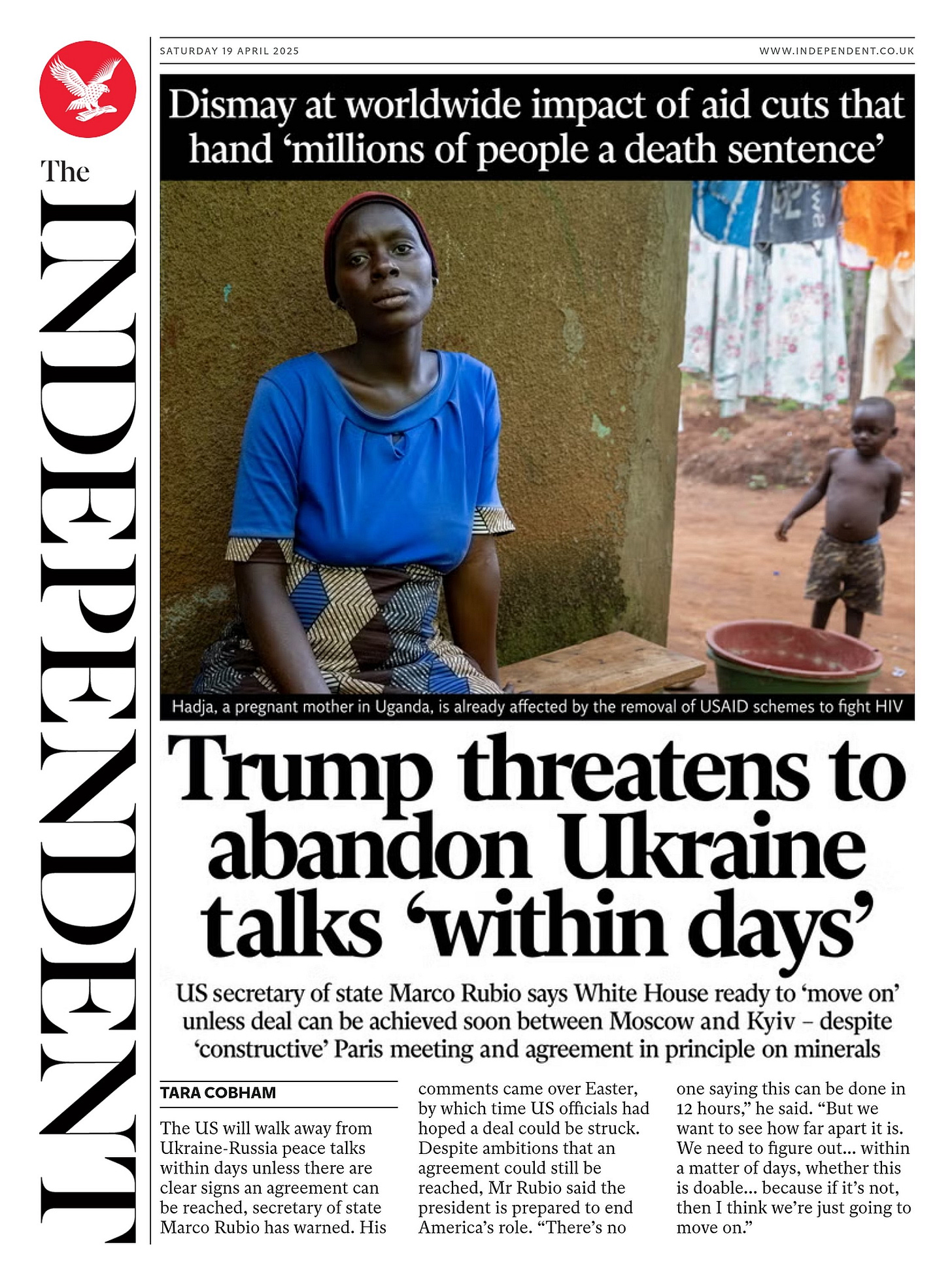

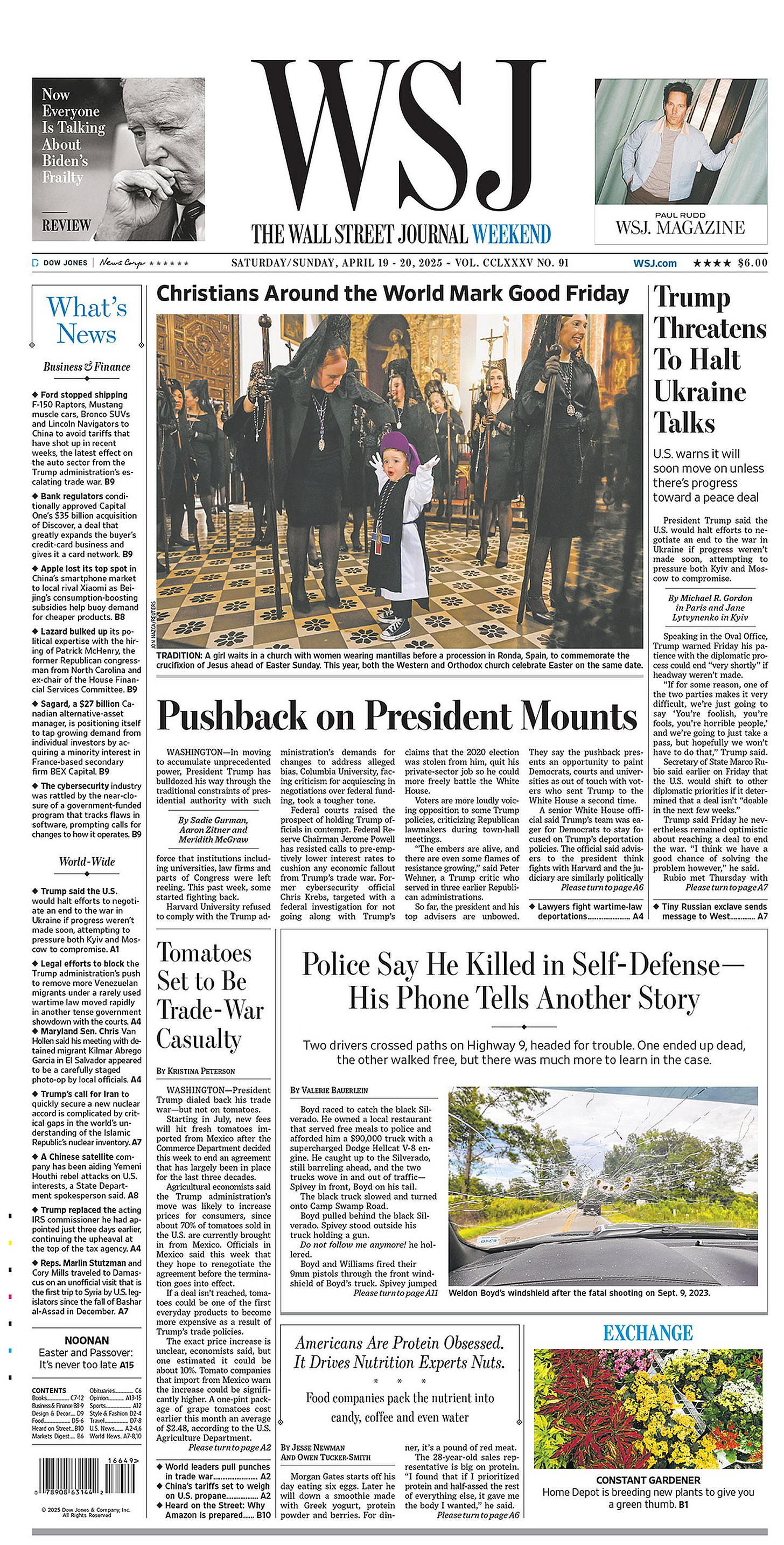
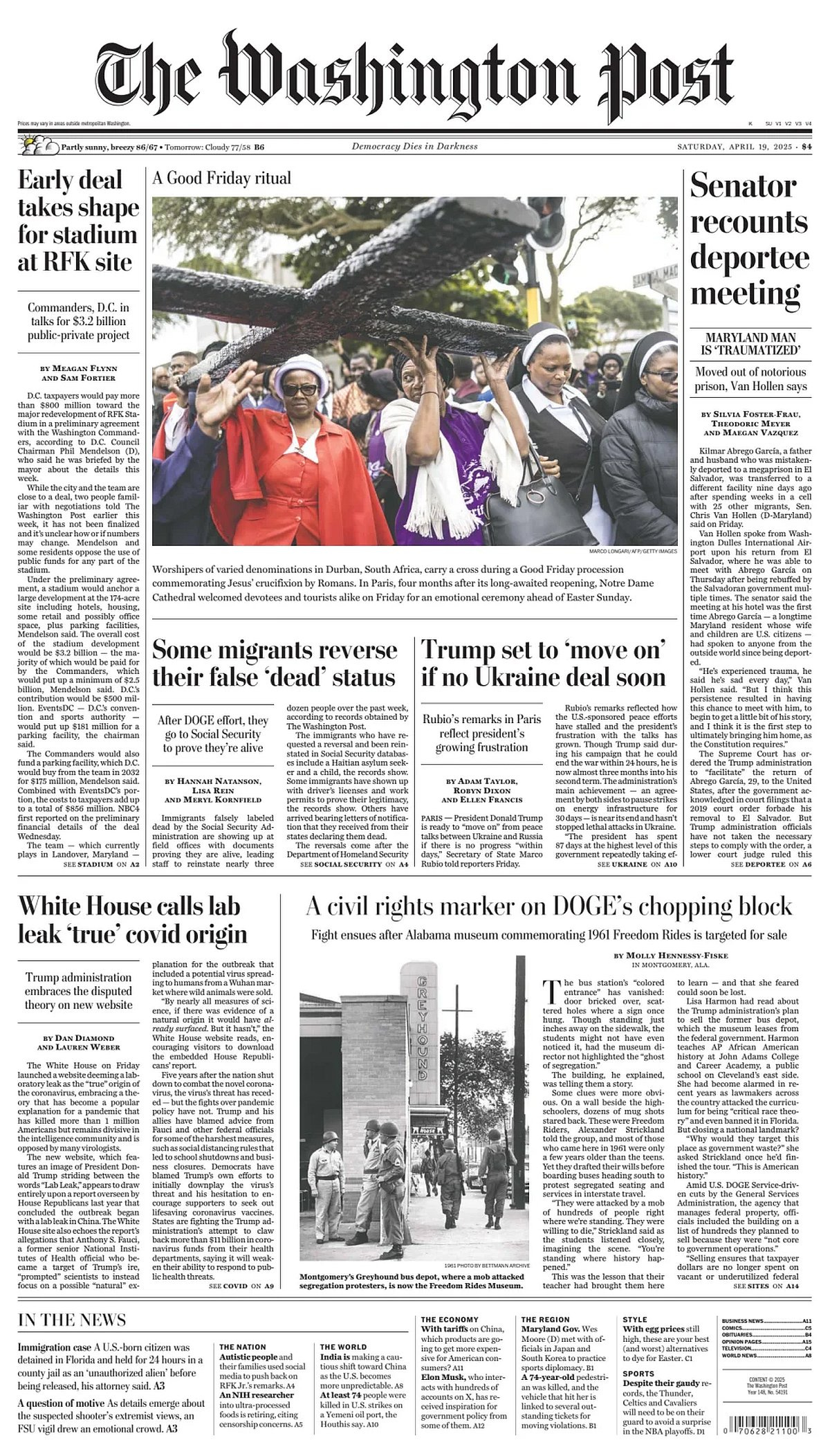
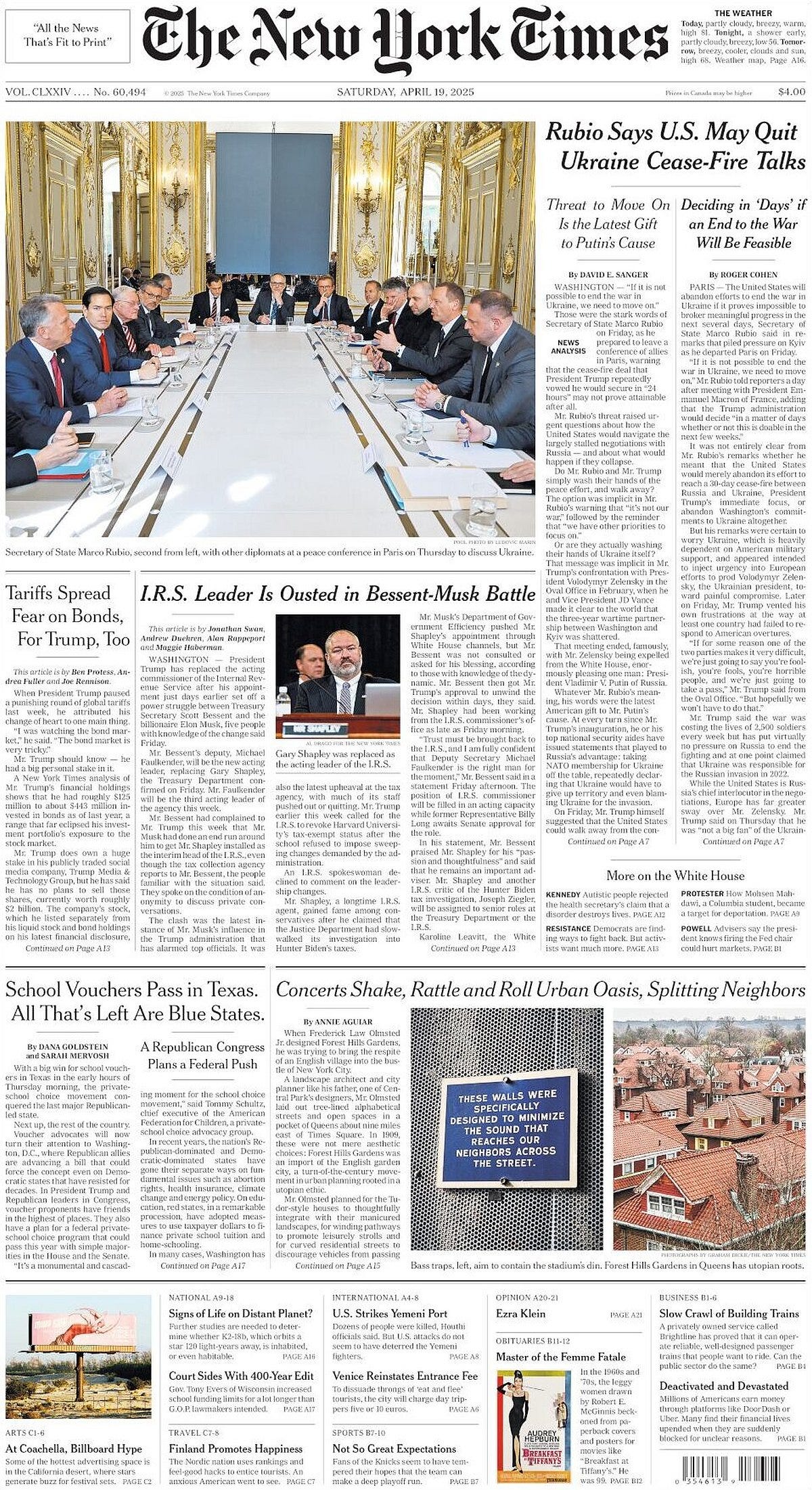
Russian newspapers report growing economic challenges: airfares could rise by 40%, mortgage arrears are at record levels, and wage arrears are rising for the second year in a row.
Prices for basic goods such as potatoes and butter have risen significantly, hitting Russian households hard.
Donald Trump’s unpredictable trade policy is creating fears of a recession and negatively affecting oil prices, which could lead to a budget deficit in Russia.
A Levada poll shows that 63% of Russians believe rising prices are the country’s biggest problem. This is being felt by Russians, who have seen all basic goods become more expensive in recent months. For example, the price of potatoes has increased by 90% over the past year, while butter has become 35% more expensive.
For Russia, the fall in oil prices will be one of the main consequences of the US tariffs. $60 a barrel is the average annual price for Urals crude that is comfortable for Russia’s economy, a Russian economist told the newspaper, according to the BBC’s Russia editor.
If the price is $40, then gross domestic product (GDP) will fall. $50 is the dividing line and that corresponds to approximately zero growth.
On April 9, the price of crude oil fell below $50 a barrel for the first time since June 2023. This week the price has recovered somewhat, but the International Energy Agency predicts another drop.
In February this year, the independent, non-governmental agency Levada conducted a poll with the following question: “Which of the following problems in our society worry you the most, and do you consider them the most urgent?” 63 percent answered that rising prices are Russia’s biggest problem.
– Inflation will become a serious challenge for ordinary Russians and the country's economy in 2025. Everything around us continues to jump in price: vegetables, housing costs, electricity, water, sewage, medicine and transport, Rosenberg was quoted as saying by the Moskovskij Komsomolets newspaper in early February.
https://x.com/BBCSteveR/status/1887049600898318593?ref_src=twsrc%5Etfw%7Ctwcamp%5Etweetembed%7Ctwterm%5E1887049600898318593%7Ctwgr%5Ea3d2701f08626219037779d465c75622d633dbe0%7Ctwcon%5Es1_c10&ref_url=https%3A%2F%2Fsmartembedtwitterxtweet.getbagera.no%2Fapi%2Fmnemonic%2Fv2%2Frender-iframe%2F%3Furl%3Dhttps3A2F2Fx.com2FBBCSteveR2Fstatus2F18870496008983185933Fref_src3Dtwsrc255Etfw257Ctwcamp255Etweetembed257Ctwterm255E1887049600898318593257Ctwgr255Eede18bce3a5d15f112d7f0eb5c17caf6f803b788257Ctwcon255Es1_c1026ref_url3Dhttps253A252F252Fsmartembedtwitterxtweet.getbagera.no252Fapi252Fmnemonic252Fv2252Frender-iframe252F253Furl253Dhttps3A2F2Fx.com2FBBCSteveR2Fstatus2F1887049600898318593publication253Dwww.nettavisen.noid253Dsmartembed-twitter_x_tweetpublication%3Dwww.nettavisen.noid%3Dsmartembed-twitter_x_tweet